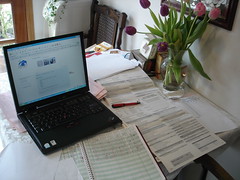Feedback and rubrics
By Mary Bigelow
Posted on 2011-08-06
 I once worked with a principal who encouraged us to check off the comments boxes on progress reports and report cards. Most of these were rather generic and impersonal. We thought—wouldn’t it be great to have database of comments to choose from that really reflected our science activities and goals? Fast forward a few years to Report Card Comments, an online tool that that can be customized to do just that.
I once worked with a principal who encouraged us to check off the comments boxes on progress reports and report cards. Most of these were rather generic and impersonal. We thought—wouldn’t it be great to have database of comments to choose from that really reflected our science activities and goals? Fast forward a few years to Report Card Comments, an online tool that that can be customized to do just that.
As with many tools, you need to register (it’s free). You can use existing comment banks, or (better yet) create your own—with comments related to skills or specific learning goals (e.g., Demonstrated how to use a microscope to prepared slides. Created a wet mount slide.). This would be very useful if you’re using standards-based or narrative reporting. The student’s name and gender is added to the comments. At this point, you must copy and paste the “report” you create, but it’s better than doing a lot of original typing and the comment set can be saved and modified. I suspect you could paste into a document and then merge into letters or other documents. Or it’s interesting just to see the range of comments that other teachers use.
Another way to provide feedback to students is through rubrics. Many articles in NSTA journals include examples of rubrics for the activity or project, and they are often made available in the Connections for the issue. There are also many online tools for creating and formatting rubrics. I recently became aware of iRubric, which is part of the RCampus site (which is described as “a comprehensive education management system and a collaborative learning environment”). This is free, but it does require a registration. You can create rubrics from scratch, but the real value seems to be in the “gallery” of rubrics already created. You can use these as is, or modify them and re-save them. It seems a little overwhelming at first, but learning about and using the tool could be a project for a team of teachers.
If you’re looking for opportunities to create an individualized professional development plan, learning about and using tools such as these could be part of a goal to improve communications with students and parents or to provide meaningful feedback on activities. Just a thought …
Photo: http://www.flickr.com/photos/ahlness/424645772/
Disclaimer: The views expressed in this blog post are those of the author(s) and do not necessarily reflect the official position of the National Science Teaching Association (NSTA).

